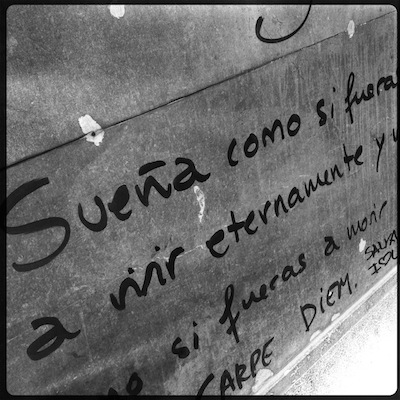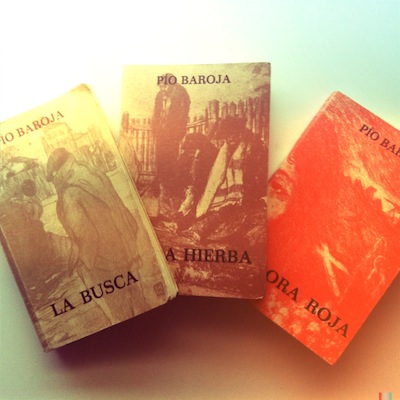Estrella de la mañana
Morning star

Es, sin ninguna duda, uno de esos momentos por los que vivir.
Porque la noche, especialmente para aquellos que la viven en el silencio, la contemplación, la lectura, la creación o haciendo el amor…
Transcurre en una cadencia paulatina, oscura, oculta, pero fugaz y siempre cambiante.
Un ritmo solo discernible al transcurrir intermitente de las horas, y cuya aprehensión real nos llevaría toda una vida de observación y reserva.
Un orden lento y sosegado, pero leve y volátil, tan interminable e inalcanzable como cualquier momento dado, pero que a cierta hora nos hace inevitablemente despertar, de forma irremisible, a la dulzura de la primera luz de la mañana.
It is, no doubt, one of those moments for which to live.
Because the night, specially for those who live it in silence, contemplation, reading, creation or making love…
Goes by in a slow, dark, occult cadence, one that is also fleeting and ever-changing.
A rhythm only perceptible when hours intermitently pass by, and whose real apprehension would take a lifetime of observation and confidence.
A slow, peaceful order, yet volatile and brief, as endless and out of reach as any given moment, but one that come a certain time will inevitably make us look up to the sweetness of the first morning light.
La Escuela de la Vida abre en Londres
The School of Life opens in London
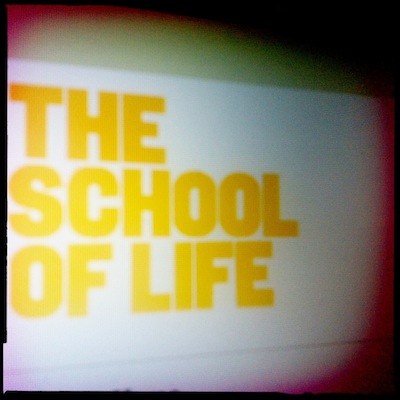
¿Alguna vez os habéis preguntado por qué en el colegio no nos enseñan materias como sentido común, empatía, relaciones interpersonales, manejo del dinero, equilibrio emocional o sexualidad sana?
Recientemente, ha abierto en Londres un híbrido entre tienda, taller y academia de lo más curioso, ya que su objetivo no es otro que enseñarnos a vivir.
Entre sus miembros fundadores, está el filósofo Alain de Botton, al que muchos recordaréis por su entretenido y brillante Cómo cambiar tu vida con Proust.
Con elementos presenciales como charlas, clases o biblioterapia, su concepto se aproxima más al de la enseñanza de la estoa que a eso que solemos llamar auto-ayuda. Y para los que no podemos ir, también han publicado una interesante colección de libros.
Have you ever wondered why we are not taught at school subjects such as common sense, empathy, interpersonal relationships, money administration, emotional balance or healthy sexuality?
Recently, a hybrid of store, workshop and academy has opened in London whose goal is no other than to teach us how to live.
Among its members, you can find philosopher Alain de Botton, well known by his entertaining and brilliant How Proust can change your life.
With on-site educational elements such as classroms, lectures or bibliotherapy, its concept is closer to the stoa way of teaching than that which we usually call self-help. And for those of us who cannot regulary attend, an interesting series of books has been published. Are you sure you know how to live?
William Blake en CaixaForum
William Blake at CaixaForum
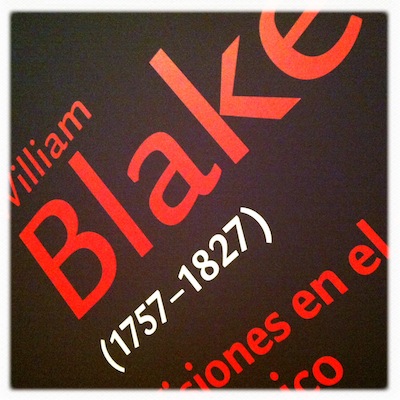
Pocos artistas hay cuya capacidad de inventiva, más allá de la habitual reinterpretación del vocabulario clásico que conforma el llamado "arte occidental", llegue a extremos como la de William Blake.
En CaixaForum de Madrid puede comprobarse hasta qué punto pudo llegar el vigor creativo de un artista único, cuya vida, filosofía, religión y manera de pensar estuvieron marcados por su fuerte carácter, su clarividencia aparentemente real y la seguridad con que escribía, describía y dibujaba lo inmaterial, lo inconmensurable y lo infinito.
Un homenaje iluminador en estos tiempos de inestabilidad y cambio, en los que la llama de Blake nos sirve de candela para recorrer un camino que ha de descubrirnos, como lo haría un libro de revelaciones, nuestro destino como humanos.
There are very few artists whose inventiveness, beyond the usual re-interpretation of classical vocabulary that we know as "occidental art", reaches the extremes that those of William Blake's.
At Madrid's Caixaforum it can be proved how immesurable were the limits that this unique artist reached with his creative vigour, and whose life, philosophy, religion and passions were branded by his strong character, his apparently infinite clairvoyance and the security with which he wrote, described and drew the immaterial and the divine.
An enlightening homage in times like his, of unstability and chante, in which Blake's candle illuminates a path to be walked to discover our measureless destiny, as if written in a book of revelations, of human beings.
Submarino de Joe Dunthorne
Joe Dunthorne’s Submarine
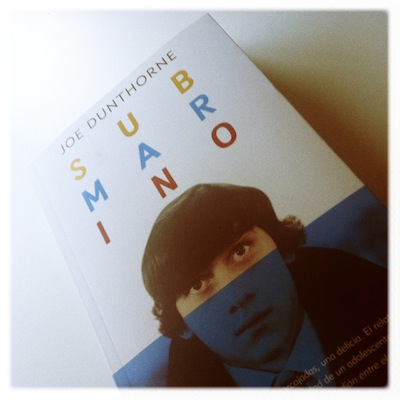
Hay un momento específico en ese difícil tiempo llamado "adolescencia" en que todo parece enormemente difícil, inseguro, vergonzante, insuperable, complejo, ilógico, traumático, incomprensible, insoportable, imposible y fuera de control.
¡O es que quizá todo ese período de adolescencia es definible así!
En cualquier caso, es tambien la época en que tomamos nuestras primeras decisiones, ganamos independencia, seguridad en nosotros mismos y nos atrevemos a equivocarnos sin temer las consecuencias, es decir: nos hacemos adultos.
Esta es, pues, la historia que Joe cuenta en "Submarino", y lo hace de forma sincera, divertida y auténtica, con una prosa rápida y un estilo lleno de guiños pop que os devolverá por unas horas a esa época… u os ayudará a salir de ella si aún estais allí.
There is a specific time in that difficult period called "adolescence" in which everything seems enormously dificult, insecure, embarrasing, unsurmountable, complex, illogical, traumatic, incomprehensible, unbearable, impossible and out of control.
Wait. All adolescence feels that way.
Anyway, it is the time in which we take our first real choices, we earn our independence, we slowly build our self-steem and we dare to fail without fearing for the consequences: in all, a painful process after which we turn into adults.
This is the story that Joe tells us in "Submarine", and he does it in a sincere, brilliant, funny and authentic way, with a cool, fast prose and a rich style full of pop winks that will make you gladly return for some hours to that phase… or, if you are still stuck there, will definitely help you get the hell out of it!
Hugh Laurie y la Copper Bottom Band en el Price
Hugh Laurie and the Copper Bottom Band at the Price
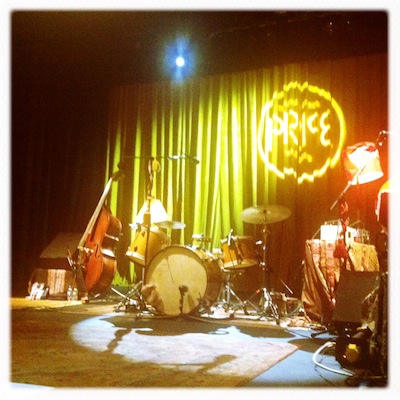
La prueba de que una música vive es que tenga la capacidad de arrastrarnos a la época, lugar o cultura donde fue concebida.
Así pues, no es de extrañar que sean la voz y las manos de un actor, pianista y escritor (y algunas cosas más), las más capacitadas para servirnos de guía en ese viaje a donde la música se hace tiempo.
Así, Hugh Laurie y su Copper Bottom Band nos llevaron, por las calles de la eterna Nueva Orleans a conocer un blues viejo como los nombres de Professor Longhair, Mahalia Jackson, Louis Armstrong o Buddy Olden, con numerosas paradas en el camino para narrarnos antiguas historias que nunca se moverán de allí donde se perdieron.
Tiene sentido, pues, que quien interpreta estas canciones, nuestro guía, sea precisamente, y entre todas las cosas… un actor.
The proof that a style of music is alive must be deemed by its ability to take us to the time, place or culture where it was conceived.
Therefore, it is no wonder that the voice and hands of an actor, pianist and writer (and something else) are the most capable ones to serve as our guide in that voyage where music turns into time.
So, Hugh Laurie and the Copper Bottom Band took us through the streets of eternal New Orleans to meet a kind of blues as old as the names of Professor Longhair, Mahalia Jackson, Louis Armstrong or Buddy Olden, with many stops on the way to tell ancient stories that will never move from where they got lost.
It makes sense then, that he who performs these songs, is precisely and among all things… an actor.
Unquestionable presence de Atheist
Atheist’s Unquestionable presence
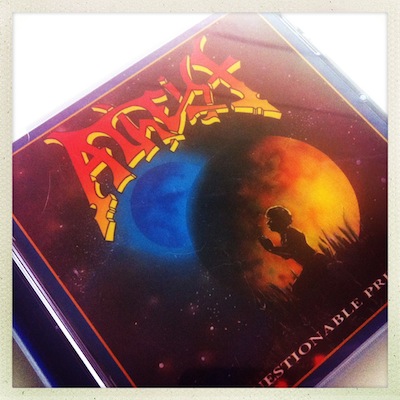
Todo metalero que se precie tiene una lista de discos que daría a escuchar a personas a las que [creen que] no les gusta el metal. No es que no les guste… ¡Es que aún no saben apreciarlo! Y por suerte, como todo lo que "no se sabe"… se puede aprender.
Entre dichos discos, se encuentra Unquestionable Presence de los floridianos Atheist, publicado en 1991 y que no ha envejecido un ápice: extremadamente técnico, sin dejar nunca de resultar efectivo; que comparte la forma del mejor death metal con influencias tan [supuestamente] ajenas al metal como la percusión latina, el jazz o el funk; melódico y rabiosamente extremo; variado y progresivo; sin dejar que las canciones se disuelvan en tour de forces y manteniendo el fluido sentido de la mejor música…
Uno de esos discos, en suma, que todo melómano de verdad debería experimentar.
Every metalhead proud of that name has a list of records who people that [believe that] don't like metal should listen to. It's not that they do not like it… It's just that they don't know how to appreciate it yet! And luckily, everything that people "don't know" can be learnt.
In my personal list, you can find Unquestionable Presence by floridian death metallers Atheist. It was released in 1991 and has not aged a bit: extremely techical without losing effectiveness; sharing the forms of the best death metal with influences as [supposedly] alien to metal, such as Latin percussion, jazz or funk; melodic and rabidly extreme; varied and progressive, not letting songs ever dissolve into technical tour de forces and always keeping the fluent sense of the best music…
One of those recordings, that every true music lover should experiment.
Entretelas de Rubén del Rincón
Rubén del Rincón’s Entretelas
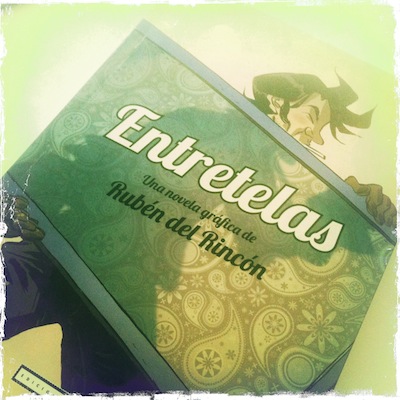
¡Cómo echaba en falta una novela gráfica como Entretelas!
De una manera casi mágica, con su estilo vivaz, nervioso, manierista y expresivo, Rubén acierta a llevarnos de vuelta a unos años 80 que parecen más actuales que nunca, no solo por lo que se refiere a la estética…
Sino también por retratar el proceso de toma de conciencia de unos trabajadores sobre sus destinos laborales, familiares y personales, para lo que se valen de algo que jamás podrán robarles: la solidaridad.
Una obra costumbrista en la mejor tradición, que también os descubrirá la historia de los llamados charnegos, inmigrantes interiores sobre los que os recomiendo que no os perdáis por nada, la cojonuda introducción de Javier Cosnava.
How greatly I was missing a graphic novel such as Entretelas!
In an almost magical way, with a lively, nervous, manierist, expressive style, Ruben hits the spot when he takes us back to the 80's, that nowadays seem more current than ever, not only aesthetically-wise speaking…
But also because they portrait the process of how a bunch of workers become aware of their laboral, familiar and personal fates, for which they use something that no one will be ever able to take away from them: solidarity.
A costumbrist work in the best tradition, in which you will also learn about the charnegos, interior immigrants about which I recommend you don't miss the cojonuda introduction by Javier Cosnava.
Grano de arroz
Rice grain

Las señales están ahí, como antorchas en la noche. ¿Las véis?
No os preocupéis si no es así. Es normal que ocurra de esta manera. En un mundo en que faroles, farolas, lámparas, flexos, fuegos, bombillas, fluorescentes, flashes, tungstenos, farolillos, focos, halógenos y neones nos deslumbran de día y de noche…
Es normal que algo tan pequeño como un grano de arroz llegue a pasar desapercibido entre todo aquello que nos deslumbra.
Sin embargo, hace poco he aprendido una lección:, si vivimos con la suficiente calma, atención y cuidado como para no dejar pasar ni un solo destello, chispa o fulgor, por leves y mínimos que sean, podemos encontrar algo tan importante el Camino de vuelta a casa.
The signals are there, as torches in the night. Can't you see them?
Don't worry if it is not the case. It is normal that it should happen this way. In a world in which streetlights, reading lamps, fires, lightbulbs, fluorescent lights, tungsten, chinese lanterns, flash lights, spotlights and neon lights dazzles us day and night…
It is normal that something as small as a grain of rice can go unnoticed among al those blinging lights.
Nonetheless, I recently learned something: if we live with enough calm, attention and care as to not letting pass by a single spark, twinkle or brilliance, no matter how light and minimal, we can find something as important as the Way home.
